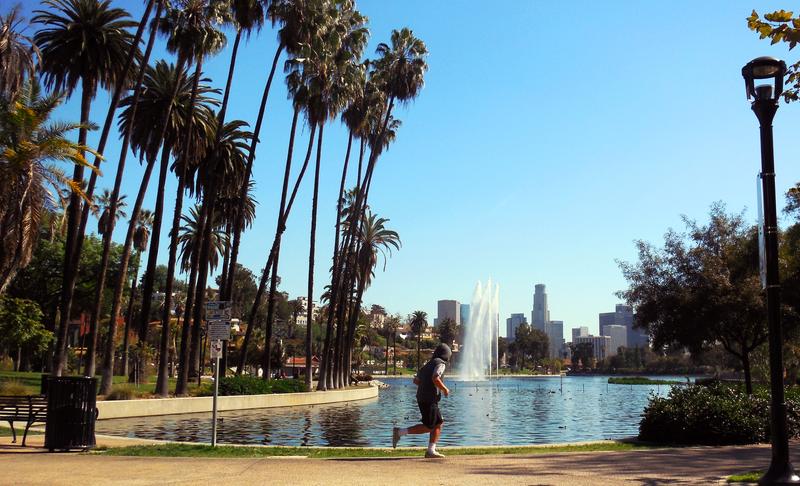Saul: Do you live here in Echo Park?
Matthew: I was born and raised here.
Saul: You were born here. What do you think about it?
Matthew: What do I think about Echo Park? I love Echo Park. What do I think about gentrification? Gentrification sucks.
Saul: [chuckles]
Kai: This is Matthew. He's talking with Saul Gonzalez from KCRW in Los Angeles. Earlier this summer, Saul was showing me around Echo Park, explaining how the neighborhood has changed in recent years. Matthew overheard us and he wanted to chime in. At first he seemed pretty clear, gentrification sucks, but he's 24 and he's got to admit, he likes pressed juices and hip bars as much as the next kid.
Saul: What do you think about the new Echo Park? What do you think about the Lassens and the $3.50 coffee place down the street and all the white people, frankly?
Matthew: What do I think about it? A lot of pretty girls out here, that's what I think.
Saul: [laughs]
Matthew: It's a double-edged sword.
Saul: As with many things in life, man.
Kai: The neighborhood's part of a corridor of gentrification that runs through LA's East Side, from Echo Park through Highland Park. It's hipster heaven. This, as Saul says, is the new Echo Park, but the old one, it's still there too. What are we looking at here?
Saul: This is quintessential Echo Park right now, Kai. It is the traditional Latino market, selling jicama and vegetables and, totally, Latino clientele through and through.
Kai: Folks sitting out in front of the store just chilling.
Saul: Exactly. It's the LA version of front stoop life and right next door to it, a fairly new, dare I say, hipster juice bar-coffee house-restaurant combination. These are the two worlds of Echo Park right next to each other.
Kai: The two worlds of Los Angeles, really. Old and new competing for space for primacy and Matthew, he says he wants to live in both.
Matthew: There's a sense of culture here that people come towards and that's us. That's the pan dulce, that's the tamales that we bring. The sense of community, right, and people, they gravitate to that, and that's fine, but, you know, what happens when you start getting prices up, the rent? The main thing is that it's getting way harder to live in a community where you grew up in.
Kai: Welcome back to "There Goes the Neighborhood." I'm Kai Wright and when I last spoke to you all, we were in East New York, Brooklyn. We spent eight episodes last spring, exploring the Brooklyn housing market at the time, the least affordable home buying market in the nation. Since then our friends at KCRW in Los Angeles have been looking at their own city, which is now the least affordable housing market for buyers and renters in the nation.
Over the next several weeks, Saul Gonzalez is going to lead a conversation here about Los Angeles, about its exploding debate over gentrification, displacement and more than that, over the city's vision for itself.
[music]
Kai: You can find "There Goes the Neighborhood LA" on Apple podcasts or wherever you get your podcasts. Subscribe and tell your friends to subscribe. Please leave a review. We'd been crisscrossing LA, listening to lots of people who've been affected by gentrification. Here's some of what you'll hear.
Speaker 1: When a neighborhood improves, it's likely that the people that put up with stuff that was here before it was an attractive place to live aren't always able to benefit.
Speaker 2: [Spanish language]
Speaker 3: If we don't really involve ourselves, we might not have a history in LA because that history might end up just getting rewritten because of the way they're transforming these communities.
Speaker 4: We love that the development is coming. We love that the change is coming. However, we want to make sure that the people are part of that change.
Speaker 5: If I get pushed out of the arts district with the name of the neighborhood named after me, then I'm going to go gentrify somebody else and push somebody else out, that doesn't make me feel good.
Speaker 6: I'm homeless right now. I have not been able to find the place because people don't want Section 8. They make it hard for us to find places.
Speakers: There goes the neighborhood.
Copyright © 2020 New York Public Radio. All rights reserved. Visit our website terms of use at www.wnyc.org for further information.
New York Public Radio transcripts are created on a rush deadline, often by contractors. This text may not be in its final form and may be updated or revised in the future. Accuracy and availability may vary. The authoritative record of New York Public Radio’s programming is the audio record.
